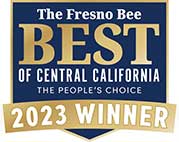Did you know that there are 20,000 different species of bees around the world, and that a whopping 4,000 species are native to the United States? Many of the native species are smaller than a grain of rice and nearly 10% of bees in the United States still don’t even have names or descriptions.
Arguably the most famous of the bee species is the Honey bee, which was originally imported from Europe in the 17th century. Though not a United States native, the honey bee helps pollinate many U.S. fruit, vegetable and nut crops. In a single year, one honey bee colony can collect about 40 pounds of pollen and 265 pounds of nectar. That’s a lot of work for 30,000 – 80,000 bees, especially when you consider that not all of them are worker bees.
And while their job as pollinators is exactly that, let us also not forget about the other way in which we benefit from these tiny titans: honey. Aside from its many uses as a sweet ingredient in some of the world’s most delectable dishes, honey also has several health benefits and is widely and effectively used to treat several ailments such as soothing sore throats, killing antibiotic-resistant bacteria with it’s anti-microbial and anti-bacterial properties, and fixing dandruff and scalp issues.
With such tiny bodies producing so much for the world, it’s no surprise that there is a whole day dedicated to celebrating them! World Honey Bee Day is celebrated every third Saturday in August. It’s a day to recognize the beauty and value they offer the world, as well as raise awareness to the dangers of extinction and how we can help to make sure our small but mighty friends thrive for years to come.
So how can you celebrate World Honey Bee Day?
- For starters, you can plant a nectar garden! Honey bees depend on nectar from a variety of plants for survival. You can also collect and spread local wildflower seeds to promote pollination.
- Buy locally sourced honey from your local beekeepers. Supporting local beekeepers has many environmental benefits. Having thousands of local pollinators fertilize plants so that they can grow and reproduce means more food available to eat and more flowers to contribute to your area’s ecosystem, as well as decorate your homes and surroundings.
- Bees and beekeepers also greatly contribute to the economy. In the United States, over $15 billion worth of crops are pollinated by bees each year, and most of those crops come from California. Supporting your local beekeepers feeds the population and the economy, so be sure you buy locally sourced honey and bees wax products.
- Never stop learning. There are so many things to learn about honey bees, but the most important thing you can learn on World Honey Bee Day is how to protect this precious species, and help it to thrive.
Next time you see our fuzzy, friendly pollinators buzzing around, remember how valuable they are to the whole world, and how crucial it is for us to do our part to protect them.
